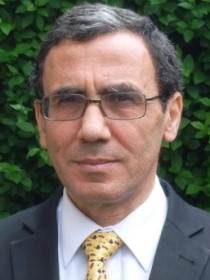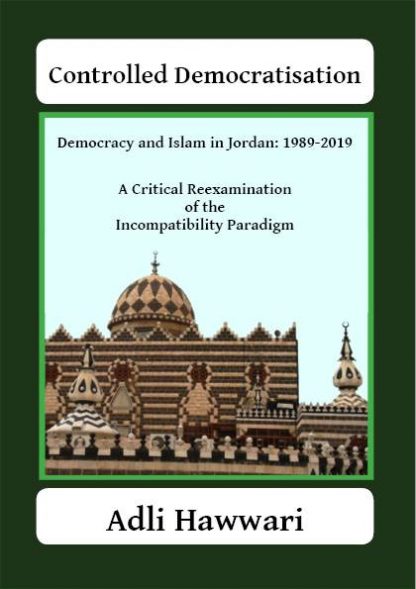Controlled Democratisation: Democracy and Islam in Jordan
Islamism and Democracy
Dr. Adli Hawwari
 In this chapter, I continue the discussion of the incompatibility of Islam, Islamism and democracy.
In this chapter, I continue the discussion of the incompatibility of Islam, Islamism and democracy.
In an attempt to be less sweeping in making the claim that Islam is incompatible with democracy, certain scholars felt conscious of the need to make a distinction between Islam, the religion, and the actions of some Muslims. This is apparent in an argument by Diamond, Liz, and Lipset (1988, p. 174):
What we are witnessing is the transition from a relatively tolerant and open kind of Islam to an Islam that is setting itself as an autonomous political force. Whereas the first type was compatible with democracy, the second is more of an obstacle, for it implies a totalitarian vision of society.
Diamond, Liz, and Lipset further argue that ‘Islam has become an ideology of mobilization and protests’ (p. 173). There has been movement away from using ‘Islamic’ when referring to groups with Islamic orientation. The term ‘Islamicist’, used by Robins (1991, p. 192) points to an attempt to distinguish the religious aspect of Islam from the one mixed with politics. The formula used to make a distinction is adopted by Halliday (1995), agreeing with Keddie (1986), that Islamic denotes the religious aspect of religion, while Islamist denotes the political (p. 349).
The desire to differentiate between the religious and political comes as well from Muslims who have objected to calling some groups Islamic on two grounds: one is that it implies other groups are not Islamic. The other ground is that when called ‘Islamic’, such groups are ascribed a role they are not entitled to, nor do they deserve, namely, appearing to be representing Islam and Muslims. Consequently, the term political Islam appeared in Arabic (Islam siyasi), and is in wide circulation. Others have opted to make a non-standard adjective form Islam, so instead of Islāmī (Islamic), the term Islamawy was coined.
Initially, there was no problem with describing various movements as Islamic. El-Affendi (2002, p. 44) has argued that to call the groups engaged in politics ‘Islamic’ does not mean other groups are not. He uses the analogy of calling a party democratic, and says the name does not mean that other parties are not. Such an argument is ascertained by political realities in democratic countries.
No one will suggest that because there is a party called the Democratic Party in the US, then the Republican Party is not democratic. Moreover, in the UK one party is called Labour, and another is the Conservative Party. No one will suggest that the Labour Party looks after the interests of only working people, or that the Conservative Party looks after people who have conservative attitudes.
The point being made here is that the arguments about the name and its connotations, or an adjective, seem superficial. Therefore, I shall look for more substantive arguments against Islamism.
Objections to Islamism
If the claim of democracy’s incompatibility with Islam receded, another one ascended: with Islamism. Kramer (1997) identifies four flawed assumptions, underlying some of the views that advocate involving the Islamists in political processes and power (p. 162):
= First, that the yearning for democracy is today universal, and stands behind the mass Islamist movements.
= Second, that there are ‘extremists’ and ‘moderates’ in Islamist movements, and that they can reliably be identified, classified and separated both for analytical and policy purposes (inverted commas in original).
= Third, that power has a moderating effect upon those who share or exercise it, and would have such an effect upon Islamists as well.
= Fourth, that because Islamism represents the populist will, its triumph is inevitable.
Kramer’s first point illustrates the argument that when it comes to the Muslim world, the Muslims will be condemned if they appear not to be interested in democracy. When they express aspirations in this regard, they are met with scepticism, if not dismissed. The ultimate judgement on whether the Islamists are genuine in their discourse about democracy is in the establishment of democratic systems in Muslim states. To deprive the Muslims of democracy because the Islamists are not democrats is a bizarre argument.
In the second point, Kramer lumps all Islamist movements in one category. Realistically, however, Islamist movements are not all the same. When the term ‘Islamist’ is used in such a loose manner, confusion is a natural conclusion. The point about policy is also worth discussing. Whose policy? The Israeli foreign policy planners? American planners? Jordanian foreign policy planners? It is absurd to suggest that Jordanian policymakers cannot tell the difference between the MB and groups led by al-Zarqawi and his likes.
Kramer’s third point has been put to the test by Schwedler (2006). She studied the IAF in Jordan and Islah Party in Yemen. She correctly observes (p. 194):
both have been allied with the ruling elites since their early days, so labelling them moderate because they do not seek to overthrow the existing regime fundamentally misses the point: not only were they never radical, they were never really excluded.
Therefore, whether inclusion leads to moderation remains an unresolved point. However, inclusion and consequently working with other parties within a system with defined areas of authority does not allow Islamist parties to have their way. When the MPs of the MB were included in Mudar Badran’s government in 1991, the inclusion was the right thing to do on the basis that the MB had a big bloc in the HoD. However, the five ministers were not able to dictate the government’s policy. Therefore, whether the MB or these ministers became less radical or not is irrelevant. This instance, therefore, indicates that inclusion is the option with merits that outweigh exclusion.
The fourth point in Kramer’s list is also instructive. He is wrong to suggest that other scholars are naïve to assume that the populist will triumph. To start with, the best way to have a free, measurable popular will is to have a democratic system of government. It is under this system that one can say with some confidence that ‘the people have spoken’. In a democratic system, the will of the people (the majority) prevails, and this is the right thing.
In the absence of democracy, any claim in relation to popular will is speculative. As such, it can be dismissed by Kramer and others as ‘populist’. Moreover, whether it is a populist will, or democratic popular will, there is no guarantee that it will triumph. In Algeria, the army interfered in 1992 and cancelled the results of the elections.
In Palestine in 2006, the democratic will of the people counted for nothing, as far as Israel, US, and EU were concerned because the people chose Hamas. In Chile in 1970, electing Salvador Allende was also unwelcome, and the army staged a bloody coup in 1973. Kramer will have been right if he suggested that the will of the people matters very little.
Pipes (1997, p. 65) argues that the Muslim fundamentalists are Westernised and in a way similar to nationalists in Europe. He predicts that ‘fundamentalist Islam will remain a force for some time to come’. However, he further predicts that ‘it will wither just as surely as did the other radical utopian ideologies of this century, fascism and communism’ (p.65).
There are several problematic assertions in this short statement by Pipes, who fits Popper’s description of a historicist. Popper (1957) outlines how historicists tend to make prophecies about the future relying on what they believe to be historical laws (pp. 41-45). Many Muslims wear Western clothes in their own countries, including Muslim ‘fundamentalists’. This can be seen as a sign that they have no problem with everything Western. However, Western suits and ties do not make one a Westerner, as the identity of a human being is made of more than the clothes he/she wears.
Unlike nationalists anywhere, the Muslim fundamentalists are known, in theory at least, to oppose nationalism. They consider all Muslims to be one nation, as described in the Qur’an (21:92 and 23:52: This, your nation, is a single nation, and I am your Lord. So fear me). Another verse (10:19) suggests that all people were one community (Mankind was but a single nation but then they fell into discord).
Moreover, it is not hard to agree with Pipes that fundamentalist Islam will continue for some time to come. It will probably remain a force for longer than he thinks, because fundamentalist trends in all religions never die. His prediction that ‘it will wither’ is unsound. There is a scholarly misconceived comparison between ‘fundamentalist Islam’ and fascism. Such a similarity is dismissed by another American scholar, Sciabarra (2006) who points out that the Arab world is
a mongrel mixture of theocratic fundamentalism, quasi-socialist command economies dominated by state-monopoly control of key resources (such as oil), and hereditary monarchy. It’s simply wrong to characterize this mongrel mixture in toto as “Islamofascism.” Call it theocratic statism or theocratic authoritarianism or, for its more “secular” forms, monarchical-military dictatorship, but please don’t call it “fascism.” Not unless you mean something historically specific, as in the “guild socialist” arrangements of Benito Mussolini.
Moreover, Hayes (1973) explains that there has been a ‘lack of agreement about the true nature of fascism, both of the past and present’ (p. 9). He points out that ‘fascist’ is an abused term and the intention of using it is ‘to make a controversial comment on political developments and at the same time place those whom they oppose beyond the pale of human sympathy’ (p. 9).
As Forte (2001) explains, ‘some commentators […] seek to turn the response to bin Laden into a campaign against religion itself’.(1) With little scholarly scrutiny, one can find that this is the case when one reads the claims made by some scholars such as Lewis, Huntington, Fukuyama, Pipes, and Kramer. It is all done in the name of scholarship, often at prestigious academic institutions.
It will be naïve to suggest that there are no people who genuinely distrust the Islamists’ commitment to democracy, and oppose mixing politics with religion. Religious minorities, secularists, agnostics, and even many practising Muslims will be genuinely alarmed. Therefore, these concerns will need to be addressed. Mere assurances form Islamists will not be sufficient.
Al-Sayyid (2003, p. 25) is categorical in his assertion that the ‘Islamists’ participation in democratic politics undoubtedly presents a serious threat to the maintenance of civil and political rights and democratic procedures in their home countries’. However, he does not go as far as suggesting that they should be prevented from being included.
Instead, he argues in favour of ‘safeguards to reduce the risk’. These include constitutional changes which enshrine ‘the full set of civil and political rights formulated in the Universal Declaration of Human Rights, without the limitations Muslim countries typically impose to make such rights compatible with shari‛a’ (p. 25).
The second safeguard recommended by al-Sayyid is the use of ‘proportional representation’ in the electoral system. This system, he argues, tends to prevent winning a majority of seats in parliaments. The third safeguard is a bicameral system, in which the upper chamber can act as a check on the lower (p. 25).
The fourth safeguard is ‘the establishment of a supreme constitutional council’ with various powers to protect rights. However, it is also empowered ‘to order the armed forces to overthrow, if necessary, any government convicted through judicial channels of violating citizens’ fundamental civil and political rights’ (pp. 25-26).
It is sensible to enshrine the rights and freedoms of citizens in the constitutions. Governments will argue that they are enshrined already. The point of departure in al-Sayyid’s suggestion is that rights and freedoms are enshrined without the usual qualification of being in line with shari‛a.
It will take some courage to make these particular constitutional changes, because removing the reservations will be opposed, as has been demonstrated in Jordan when the government removed its reservation on article 15 of the Convention on the Elimination of All Forms of Discrimination against Women (CEDAW).
However, the regime that will introduce these changes is unlikely to be one headed by someone who wants to stay in power for life. A change of this nature amounts to an overhaul which intends to take the entire people of the state to a new, higher level of human dignity. Therefore, although this recommendation is sensible, it overlooks the fact that this safeguard protects the citizens not from the Islamists, but also from the state.
The recommendation of using proportional representation (PR) is also sensible. However, this has its justification not only as a safeguard against Islamist participation, but as a general issue of fairness of representation. The debate about the need to adopt PR is a recurring one in the UK, whose electoral system produces majorities in the House of Commons with less than a majority of the popular vote.
The system used in the UK is known as ‘first past the post’. The candidate with the highest number of votes is declared the winner. As Beetham (2005, p. 173) explains, this system ‘can produce an assembly which is highly unrepresentative of the distribution of political opinion in the country’.
Al-Sayyid’s recommendation of a bicameral system is also recognised as being of merit. Despite the fact the House of Lords is often criticised for being an unelected body, there is recognition that it does provide a useful role when laws are rushed through the House of Commons. However, the two chambers should be elected, as in the USA.
The fourth recommendation of al-Sayyid is very problematic. A constitutional court is a good idea. It is a sign of maturity of a democracy when the constitutional court is the ultimate arbiter on what is constitutional or not (even though constitutional courts are not without debates). Al-Sayyid seems to propose a council similar to the one formed in Iran, namely, the Guardian Council, which can restrict the right to run in elections. This is contrary to a basic right in a democratic system of government.
Moreover, to empower a body to order the army to overthrow governments is an ill-considered idea. Firstly, the military should always stay out of politics. Secondly, a party which gains power in a country may enlist the support of the army, and continue to violate the fundamental rights of the citizens. The special role enjoyed by the army in Turkey has been a barrier to democracy in Turkey. In Algeria, the army’s intervention prevented the FIS from coming to power in 1992, but thrust the country into years of violence.
Al-Sayyid’s last recommendation invites another point of discussion: What if an Islamist party came to power through the ballot box, and then changed the democratic nature of the system? This hypothetical scenario will be better discussed in the Jordanian context. What if the IAF/MB came to power in Jordan?
The first point to recognise in this scenario is that the elections would have been free and fair. This second point is that the political system in Jordan would have gone through a major, substantive change of attitude, which will allow the government to be formed by the party which has the majority, or largest bloc, in the HoD. This happened only in 1956, and the government lasted merely several months. Therefore, with the powers of the king, a government formed by the Islamists will be dismissed, when the king decides that it is not implementing the policies he favours. In other words, winning the majority in elections, then forming the government will not give the Islamists a free hand to change the system, because the king has superior powers.
It is worth pointing out that the MB pledged not to change the nature of the system. In April 1990, King Hussein appointed a royal commission. The sixty members represented the political currents in the country, including the MB. The task was to produce guidelines on the conduct of political activities.
In June 1991, a document prepared by the commission was presented in a national conference and adopted unanimously. The charter stipulated the need to keep ‘the civilian and democratic character of the state’. By being represented on the commission and attending the national conference, the MB had given a pledge not to change the system of government.
Assuming that Jordan has undergone drastic changes, and the king has become a nominal constitutional monarch, will the Islamists change the democratic nature of the system?
In the event that the MB and IAF decide not to honour the pledge contained in the national charter, and the king is helpless to stop them, the assessment of Fahd al-Rimawi is that other forces of society (such as civil society organisations) will not allow this to happen.(2) Emily Nafa‛ has a similar view and points out that there are several hypothetical stages to this scenario that makes it unrealistic.(3)
I shall go a step further and imagine that the Islamists in power decide to impose measures which alter the democratic nature of the system. If they do, it will be up to the Jordanian people to oppose and reverse that. This will not be easy, and will take a long time, but it is not impossible. The peoples of Eastern Europe removed the communist regimes after many years of strict rule.(4)
= = =
(1) Guest Comment on NRO, 19 October 2001.
(2) Personal interview. Amman, 14 April 2008.
(3) Personal interview. Amman, 18 November 2010.
(4) I completed writing this chapter before the peoples in the Arab world rose to demand change. These events reinforce the argument that whoever is in power cannot keep it indefinitely in the name of a good cause, or in the name of religion. Also, see the epilogue.
Adli Hawwari (2020). Controlled Democratisation: Democracy and Islam in Jordan, 1989-2019 : A Critical Reexamination of the Incompatibility Paradigm. London: Ud Al-Nad.

- cover democracy and Isalm
 https://orcid.org/0000-0003-4420-3590
https://orcid.org/0000-0003-4420-3590




